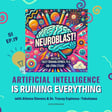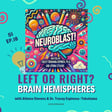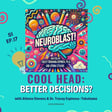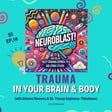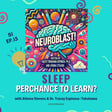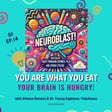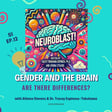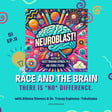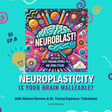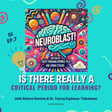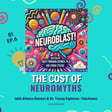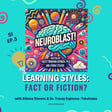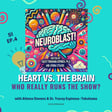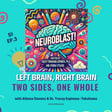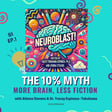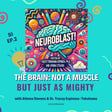Become a Creator today!Start creating today - Share your story with the world!
Start for free
00:00:00
00:00:01

Nature via Nurture: They're in this Together
This episode of Neuroblast explores the age-old Nature vs. Nurture debate with guest Tracey Tokuhama-Espinosa. It debunks the myth of inherited intelligence, explaining how genes and environment interact (nature via nurture). Through real-world examples and research, the hosts highlight how enriched environments can unlock potential, proving learning isn’t just genetic!
Original music by: Julian Starr
Transcript
Introduction to Hosts and Topic
00:00:00
Speaker
Hello and welcome to Neuroblast! Where we blast myths about your neurons one little connection at a time.
00:00:25
Speaker
I'm Athena Stevens, actress and proud owner of a magnificent brain. And I'm Tracy Tokuhama- Espinosa. I teach a course at Harvard University's Extension School and Summer School called the Neuroscience of Learning, and I'm an international educational consultant.
00:00:44
Speaker
And just so that there isn't any doubt, and we clear it I always have Dr. Tracey introduce herself because I can't say her last name, so there you go.
00:00:56
Speaker
How are you today, Tracey? I'm doing great. I'm doing great. And speaking about my last name, when I was teaching my kids to write, I said, if you can write your name, you've got half of the alphabet. So anyway, this that was like and was a good lesson for them. Yeah, we'll get to that when get to language later on. But
Nature vs. Nurture Debate
00:01:16
Speaker
today, we are taking on one of the oldest arguments ever, ever, ever, that is nature versus nature.
00:01:28
Speaker
Is it all in your DNA or does the environment really make you who you are? So are we going to settle the debate once and for all here on Neuroblast?
00:01:43
Speaker
I don't know if we're going to be able to settle the whole debate that's been around for about 100 years, but I think we can contribute to some really interesting thinking um that's evolved really only in the past decade. So I think it's going to add to the conversation and hopefully people will tip on their own.
00:02:00
Speaker
Great. Let's throw some science at the audience and see what we can make of it. Oh, Tracy, where does this... Actually, I'm not going to call it a myth today.
00:02:14
Speaker
Where does this debate come from?
Genetics as Determinants of Traits
00:02:17
Speaker
Well, people so have always been prone to thinking, well, this is just like my father or just like my mother or all of my traits are inherited. And so there's a really strong belief that things were just in your genes. You are who you are based on the genes you inherit.
00:02:33
Speaker
And since that's some of the earlier science, you know, we were able to plot and note that our genomes and everybody thought, well, we can attribute behavior we can attribute everything to genes. And that's just not true.
Role of Environment in Gene Expression
00:02:46
Speaker
And what has come up over the past decade that is absolutely fascinating is the influence that your environment plays. And especially um in this newer field or this field that's really developed a lot faster than others in neuroscience, in epigenetics, looking at how the environment plays a huge role in potentiating or triggering um some genes. And so what's so fascinating, and this is Pamela Cantor's work, she points out that only a fraction, maybe 10 maybe 20, but around 10% of your genes are actually potentiated by the environment you live in. So it's really not that all your genes play into all of who you are, but that your environment actually determines how your genes end up becoming
00:03:34
Speaker
potentiated and used. And so um she's really leaning into the idea of how context, how our cultures, how our upbringing, how our family structures influence and change who we become in our lives. And so, as we mentioned, you know, in another podcast, you know, nature nurtures all your parents' fault.
00:03:53
Speaker
It's true to a certain extent. Some of it is genes, but a huge amount of that is actually the environments we set up for our kids and ah the environments that people grow up in, in terms of society or family structures or the schools they go to, that really makes a huge difference in which genes actually get potentiated or not.
00:04:12
Speaker
And that in turn determines our behavior. So it's not the old idea that, you know, oh, it's just what you inherited from your parents. You have no way to get around it was really thrown out the window. We're pretty much um maybe in the late nineties, when we began to look at this idea of having growth mindsets, for example, um,
00:04:31
Speaker
If you understand neuroplasticity, you realize that you have some power over how your brain will learn. And so, you know, I can't do it yet is a wonderful idea and in a growth mindset mentality is that, you know, maybe I wasn't born with these fantastic genes to be, you know, a genius at math or whatever, but I can make some choices and become better at it. And so nature via nurture is really the way to think about this now, not that nature determines everything.
00:05:02
Speaker
So let me make this concrete and you can also correct me because I'll probably need correction, but this is really cool, guys. Epigenetics is actually what made me a feminist about 10 years ago.
Insights from Twin Studies
00:05:21
Speaker
um and it also is what pulled me back into science. So say I have an identical twin. Um, and what we are absolutely identical in DNA.
00:05:37
Speaker
And, you know, monozygotic, as they call it. But let's just say that my twin sister and I were separated at birth. And, you know, I have a pretty average upbringing.
00:05:53
Speaker
She, however, is joining the circus. dances - for her job and smokes and there's all sorts of very, very different lifestyle choices and upbringing than I did because we were separated at birth.
00:06:16
Speaker
If we were to, even something as basic as if we were to meet now at age -mumbles- at age forty. Um, we could quite possibly look a different, right?
00:06:32
Speaker
Yeah, you could. You could have different body types because you have actually had different types of nutrition, um because you had different habituated ways of doing physical exercise.
00:06:44
Speaker
um She might have tons of bags under her eyes because she just has bad sleep patterns and you have good sleep patterns or good sleep habits. I mean, all kinds of things can happen to you here. And this is actually, it's not really that new. We've had, thanks to people like Plomin, who's, ah, I believe, an American in the UK, he has done huge studies starting way back in the 70s looking at, you know,
00:07:08
Speaker
longitudinal studies of twins separated birth, just as what you described here, and trying to understand which traits are more heritable than others. Um, how and how much do you inherit in terms of intelligence ah from a genetic structure or what is due to your environment?
00:07:26
Speaker
And personality, you know, how does your personality change and how does your physiology change? So there's a ton of very interesting things that he's brought up. Um, starting way back in the late 70s, he's got tons of publications, but his most recent work,
00:07:40
Speaker
is looking at trying to categorize the reasons that um environmental factors are so variable. So sometimes something in your environment will really make a huge difference in your life, but it might not make a big difference in my life. So he's trying to understand how environmental variability is changed in different people's lives based on where they live and how old they are and and sex and all the rest of that. So anyways, there's a lot of research that is going on exactly in the space that you're talking about.
00:08:10
Speaker
And you can see the differences. So there, those you the twins that you're mentioning could definitely look completely different or they could be very, very much the same. And so he's trying to figure out why.
00:08:22
Speaker
He's trying to figure out why is there this human variability at this level? What really tips people into triggering certain genetic um potentiation versus other things?
00:08:33
Speaker
And um it's actually pretty fascinating to see that. So you could really see ah a heavyset person and a scrawny person and their identical twins split at birth. Yes, you could. But there's also several cases of people who end up being very, very, very similar. And so he's trying to understand why those differences occur.
00:08:53
Speaker
Now, point of clarification I was self-taught for so long that I got this wrong. DNA itself does not change by your environment. Is
Epigenetics Explained
00:09:09
Speaker
that right? It's the potentiation.
00:09:14
Speaker
So epigenetics means on top of, basically. So your genes, your gene structure stays the same. So epigenetic changes are not changes to the physical genetic makeup at all.
00:09:25
Speaker
Um, but it does look at the potentiation of certain genes. And so your genetic makeup is the same. But which genes get potentiated by what experiences is really what's on the table right now.
00:09:54
Speaker
Absolutely. That's absolutely it. And the interesting, the really fascinating things I think are that are coming out really only in the past maybe 10 years or so, even less. Plomin's paper came out, I think, in 2015 or I can't remember, but he, he's pointing out to the idea that this variability that can occur actually changes over the lifespan.
00:10:18
Speaker
So for example, when people attribute you know your intelligence to your genetic makeup, well, he says, actually in the early years that can be, you know have a ah bigger weight than in the later years. And so over your lifespan,
00:10:34
Speaker
This type of variability of how your environment influences you um is really, really important. And so that's why things like early years experience really get a lot of talking points, right? That's very important.
00:10:47
Speaker
What happens to you in the early part of your life? Did you have you know, high quality education? Did you have people around you taking care of you, reading you, buffering you from any kind of trauma, supporting you?
00:10:59
Speaker
All of that makes a huge difference in the ultimate outcomes that you have as an adult. I think we're going to do an episode shortly on stress, but presumably long-term stress is another environmental change that can affect your potentiation.
00:11:21
Speaker
Yeah, exactly. And we know from really sad studies, for example, of um young children who are abused, even at seven months of age, they react disproportionately to mad faces, like they just anticipate that they're going to get hit or something like that. And so their stress levels are off the chart and they live like that, which is very detrimental to their brain formation. Right. And so
Impact of Environment on Development
00:11:47
Speaker
We know that definitely you can habituate reactions to stress depending on the frequency and when it happens to you, and especially in early years, how this has a hugely negative effect on the both the physical and psychological development of the child.
00:12:03
Speaker
Now, let's put this into some practicalities of what we can do. I said ah few minutes ago that epigenetics and nature via - nurture made me a feminist.
00:12:17
Speaker
And that is really true. When I found out about epigenetics, I went, even if I'm in a relationship that I can manage, I also have the obligation to provide the best for myself and for those around me, be it my children or not. What are some real-world examples of how we can to support ourselves.
00:12:49
Speaker
It's not just on you. What's going on and how you manage situations can have a huge influence on all of the other family members, especially the children in your lives. And one of the things that Cantor and Osher really bring up related to being able to maximize your own potential and things is the huge role that positive relationships play um in being supportive of our environments and support and to create supportive environments in order to maximize your own potential. And so being in, um, spaces that are loving and caring, having parents that are able, as I say, to, to be buffers to maybe the traumatic events. I've, um, I've had the, the honor, but also the, the horror to, to watch some kids in a school in Ukraine throughout this war. Um, one of,
00:13:42
Speaker
my former students as a teacher there. And how did those kids get through the day-to-day uncertainty, the bombings, the fear for your life and all the rest of that, they had an amazing um structure within the school where all of the, all the parents who were able to be there were parents to all the kids, not even the ones who who had, you know, parents who were away at the front.
00:14:09
Speaker
All the teachers were teachers to all the kids. So they decided that their community was really, all the adults were there for all of the kids and they all supported each other in a in spectacular way, which could really serve as ah mental, physical, and also neurophysiological buffer to all of that trauma that they were experiencing, which is pretty pretty incredible incredible, but that's definitely an extreme.
00:14:34
Speaker
But in other cases, we can create um school structures in which we actually help support kids develop those kinds of personal skills like resilience and all the rest of that, but that where we create ah the safe environment so that they feel that they are welcomed and and that they are protected in that space so they can learn and grow.
00:14:54
Speaker
It's a very, very hard thing um to see when many parents don't realize how important their reactions to the world are. They're barely coping and they don't realize how the way they act to situations actually can trigger things in kids or not.
00:15:14
Speaker
We know that some kids growing up in you know abject poverty can come out OK because they had parents who, you know, yes, they had poor economic situations, but they had very strong community ties and strong groups that supported their family growth.
00:15:29
Speaker
I would add on to that personally in my younger days. I would often stay in relationships, friendships, connections, jobs that I knew were not healthy, but at the end of the day, I thought I was only harming myself.
00:15:49
Speaker
And once I discovered this - amazing, almost sci-fi-like subject of epigenetics, I just went - my moral responsibility ability to create healthy environments for myself and for others has just gone off the charts because everything I do - affects something. That is not to overwhelm our listeners - - about being conscious and being cognizant, it's not just you as much as you think. I can stay in this, you know, bad relationship, and if I'm harming anyone, it's just myself.
00:16:41
Speaker
You're not. That's absolutely right. And then, I mean, we humans are social creatures and basically we have an effect on others aware or unaware of it. We, we do have effects on each other. And so um part of the most interesting recent work on epigenetics and understanding the influence of environmental factors is that um we talk about good
Defining 'Good' Environments
00:17:07
Speaker
environments. Well, what is a good environment? And that's what has been so hard. It's
00:17:12
Speaker
It's almost relative to the individual, isn't it? And so what is a ah good environment oftentimes includes feeling - cared about, being able to care for others, being in a community structure where you're able to share, those kinds of things that we don't often um talk about or articulate. We know when we have a good environment, we know we have a bad environment, but it's really hard to pinpoint what it means exactly. And part of the epigenetic studies is to parse out all of the different things that can influence those environments.
00:17:45
Speaker
What is a good environment? How do we create those good environments? There's a huge amount of research looking at how do you leve- leverage the learning sciences to create strong and positive learning environments within school structures, for example. So at that kind of a level, ah there's a lot of research going on as there is at the level of, you know, genetics and understanding how different people react to different situations.
00:18:12
Speaker
in different forms of these epigenetic manifestations. So there's a lot going on right now. It's- a lot is not completely known. What we do know is it's totally not nature in isolation is is determining who you are.
Interplay of Genetics, Environment, and Free Will
00:18:25
Speaker
um to add one more twist to this, it's not just nature via nurture, because we know that you know only a fraction of your genes are potentiated by your environment, but nature via nurture plus free will. Free will comes into this about the choices we make, the decisions we make. As you're saying, I realize this is not a healthy environment for me or for anybody. And it's actually poisoning the well by being in this you know situation and bringing myself into this um when it is so negative. And so how do you take control of those kinds of situations? Um, those are still, those are other aspects of epigenetic and impact in our life.
00:19:00
Speaker
Well, there's nothing like free will to lead us into a call to action. So this week, listeners, think about not only your environments and how your environments shape you, but it also how you can create environments for yourself and others to thrive. And that does mean making choices, doesn't it?
00:19:30
Speaker
It really does. And making, you know, good choices and and rehearsing and practicing decision making in the most, you know positive and powerful way. It's we oftentimes just fall into decisions. Like you're saying, if you you you take on a job and it's ends up kind of being a toxic environment, but you're just sort of doing it because you need the job and oh well, I'll have my weekends to myself.
00:19:52
Speaker
But that doesn't make you a happy person or live up to your own potential or add anything to that environment that you're in, right? And so part of the idea there is sort of taking stock regularly of yourself and seeing, okay, what are the things that I could actually do you know proactively um to to leverage um my environment to change my environment. You can't change your genes, but you can change which of those genes actually get potentiated. So and always wonder, how come I'm not more like my mom and X?
00:20:20
Speaker
Well, you can make some choices about how to actually do that. And so, um yeah, we're more powerful than we think. That's one of the really cool lessons about epigenetics. We are more powerful than we think.
00:20:35
Speaker
and with that power, thank you guys so much for listening to Neuroblast. If you
Conclusion and Credits
00:20:42
Speaker
enjoyed this episode, - - don't forget to like, subscribe, and share it with your friends.
00:20:48
Speaker
That is the best way to help us out. Neuroblast is produced by Aegis Productions with music by Julian Starr. Special thanks the people in this room behind me who wish to remain nameless, but set me up at my laptop to record today. And - we will see you soon. Keep those neurons firing.
00:21:13
Speaker
Thanks a lot. Bye. Bye.
